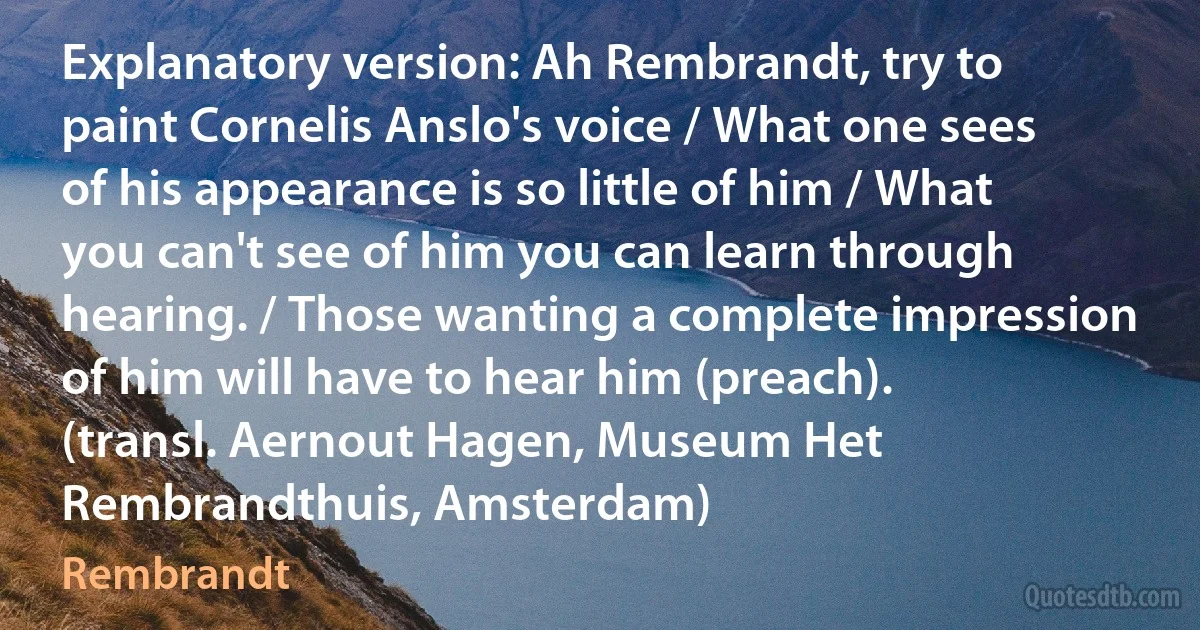Hearing Quotes - page 36
He says, "There's nothing left of me.
I'm like a ruby held up to the sunrise.
Is it still a stone, or a world
made of redness? It has no resistance
to sunlight." This is how Hallaj said, I am God,
and told the truth!The ruby and the sunrise are one. Be courageous and discipline yourself.
Completely become hearing and ear, and wear this sun-ruby as an earring.

Rumi
Suppose you meet a man who asks you what your field of endeavor is and you tell him that you are the world's greatest living vertebrate paleontologist, which is, of course, what you are. And suppose that, on hearing this, the man you meet fixes you with a glittering eye and proceeds to lecture you for five hours on vertebrate paleontology, getting all his facts wrong, yet somehow leaving you unable to argue them. You will then have met [John W.] Campbell.

John W. Campbell
I address the youth, those who sang and gave us their joy and their spirit of struggle. I address the man of Chile, the worker, the farmer, the intellectual, those who will be persecuted, because in our country fascism has been already present for many hours - in terrorist attacks, blowing up the bridges, cutting the railroad tracks, destroying the oil and gas pipelines, in the face of the silence of those who had the obligation to act.
They were committed. History will judge them.
Surely, Radio Magallanes will be silenced, and the calm metal instrument of my voice will no longer reach you. It does not matter. You will continue hearing it. I will always be next to you. At least my memory will be that of a man of dignity who was loyal to his country.

Salvador Allende
I must intreat your patience - your gentle hearing. I am not going to question your opinions. I am not going to meddle with your belief. I am not going to dictate to you mine. All that I say is, examine; enquire. Look into the nature of things. Search out the ground of your opinions, the for and the against. Know why you believe, understand what you believe, and possess a reason for the faith that is in you...
But your spiritual teachers caution you against enquiry - tell you not to read certain books; not to listen to certain people; to beware of profane learning; to submit your reason, and to receive their doctrines for truths. Such advice renders them suspicious counsellors. By their own creed, you hold your reason from their God. Go! ask them why he gave it.

Frances Wright
At that time I also had, for a short while, the strength to bear it. But all too soon I lost external sight of the shape of that beautiful man, and I saw him disappear to nothing, so quickly melting away and fusing together that I could not see or observe him outside of me, nor discern him within me. It was to me at that moment as if we were one without distinction. All of this was external, in sight, in taste, in touch, just as people may taste and see and touch receiving the external sacrament, just as a beloved may receive her lover in the full pleasure of seeing and hearing, with the one becoming one with the other. After this I remained in a state of oneness with my Beloved so that I melted into him and ceased to be myself. And I was transformed and absorbed in the spirit, and I had a vision about the following hours.

Hadewijch
In our hearing tonight, you saw an American president faced with a stark, unmistakable choice between right and wrong. There was no ambiguity, no nuance. Donald Trump made a purposeful choice to violate his oath of office, to ignore the ongoing violence against law enforcement, to threaten our Constitutional order. There is no way to excuse that behavior. It was indefensible.
And every American must consider this: Can a president who is willing to make the choices Donald Trump made during the violence of January 6th ever be trusted with any position of authority in our great nation again?

Elizabeth Cheney
Can you imagine a music in which tonality (that is, the adherence to any key) is completely suspended? I was constantly reminded of Kandinsky's large composition which also permits no trace of tonality.. ..and also of Kandinsky's 'jumping spots' in hearing this music [of Schönberg ], which allows each tone sounded to stand on its own (a kind of white canvas between the spots of color). Schönberg proceeds from the principle that the concepts of consonance and dissonance do not exist at all. A so-called dissonance is only a mere remote consonance – an idea which now occupies me constantly while painting..

Wassily Kandinsky
How can the Universe tell its own story save by making use of human speech; how convey its meanings to finite minds save by employing a thinker to declare them? So long as the story remains unspoken, unwritten, can we say it exists at all? Does not the significance of things become a story by the very process which ends in the movement of an intelligently guided pen over a sheet of paper, in the reading of printed types, in the utterance of recognised vocables; and until this process has been accomplished is not the "meaning” a mere promise or unrealized potency? Can we learn the history of the world, and of human life, otherwise than by reading, or hearing it spoken? How, then, can we receive it without the intermediation of a writer, a speaker?

L. P. Jacks
I saw various. I never saw Willie Mays. I saw Roberto Clemente. He could hit, run, field and throw. Intelligent player. And he played to win. I remember hearing Clemente say that he always tried his best, so that he would never have any self-doubts about whether he gave it his all. I think the same words were attributed to Willie Mays or Joe DiMaggio. I saw Olmo, not a lot. But from what I saw, the way he played left field, you did not forget him. Olmo was elegant. It was Clemente and Olmo.

Roberto Clemente
Trayvon Martin could have been me thirty five years ago. And when you think about why, in the African-American community at least, there is lot of pain about what happened. I think it is important to recognize that the African-American community is looking at the issue through a set of experiences and a history, that doesn't go away. There are very few African-American men in this country who haven't had the experience of being followed when they are shopping at a department store. That includes me. There are very few African-American men in this country who haven't had the experience of walking across the street and hearing the locks click on the doors of cars. That happens to me at least before I was a senator. There are very few African-Americans who haven't had the experience of getting on an elevator and a woman clutching her purse nervously and holding her breath until she had a chance to get off.

Barack Obama
A picture or representation of human figures, ought to be done in such a way as that the spectator may easily recognise, by means of their attitudes, the purpose in their minds. Thus, if you have to represent a man of noble character in the act of speaking, let his gestures be such as naturally accompany good words; and, in the same way, if you wish to depict a man of a brutal nature, give him fierce movements; as with his arms flung out towards the listener, and his head and breast thrust forward beyond his feet, as if following the speaker's hands. Thus it is with a deaf and dumb person who, when he sees two men in conversation - although he is deprived of hearing - can nevertheless understand, from the attitudes and gestures of the speakers, the nature of their discussion.

Leonardo da Vinci
Yes-the springtimes needed you. Often a star
was waiting for you to notice it. A wave rolled toward you
out of the distant past, or as you walked
under an open window, a violin
yielded itself to your hearing. All this was mission.
But could you accomplish it? Weren't you always
distracted by expectation, as if every event
announced a beloved? (Where can you find a place
to keep her, with all the huge strange thoughts inside you
going and coming and often staying all night.)

Rainer Maria Rilke
The poet is, etymologically, the maker. Like all makers, he requires a stock of raw materials - in his case, experience. Now experience is not a matter of having actually swum the Hellespont, or danced with the dervishes, or slept in a doss-house. It is a matter of sensibility and intuition, of seeing and hearing the significant things, of paying attention at the right moments, of understanding and co-ordinating. Experience is not what happens to a man; it is what a man does with what happens to him. It is a gift for dealing with the accidents of existence, not the accidents themselves. By a happy dispensation of nature, the poet generally possesses the gift of experience in conjunction with that of expression. What he says so well is therefore intrinsically of value.

Aldous Huxley
Prem Rawat has received widespread recognition for providing inspiration and guidance to audiences around the world on tonight's topic for peace. Proclamations and resolutions that honor his work: keys to the City, letters of appreciation, invitations from government officials, and these are among the many ways that he's been welcomed throughout the years. We're used to hearing about peace as the absence of war. We normally put the responsibility of peace on governments and on political organizations. We seldom talk about peace from a human-from our own-perspective. We seldom highlight the important role of each human being, each one of us, in bringing peace to the world. Tonight, we hear Prem Rawat's fresh and innovative views on peace.

Prem Rawat


